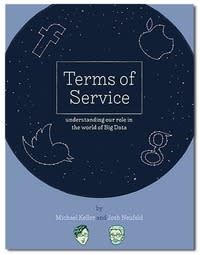Terms of Service, book review: A field guide to big data and privacy
Terms of Service: Understanding our Role in the World of Big Data • By Michael Keller and Josh Neufeld • Al Jazeera America • 46 pages • Free online and to download (ePub, PDF and iTunes)
Run a web search; don a wearable device; post a photo online. You're not just using technology — you're helping to build it, by contributing to big data.
With Uber tracking travellers who don't go home until the next morning and Fitbit data turning up in court cases to prove whether a defendant was really affected by an accident, the new book Terms of Service: Understanding Our Role in the World of Big Data is a timely look at big data and digital privacy. It's also a comic.
Try to tell the story of how we went from Al Gore and Google co-founders Sergey Brin and Larry Page avoiding attempts to regulate what information Gmail could collect about users, to checking in on Foursquare, running our social lives on Facebook, using wearable trackers and letting insurance companies track how we drive to get a discount. You have to pick and choose the points you make, or drown in a flood of statistics and links and privacy policies. Or you can pick a medium that's designed to make things clearer by illustrating them: the comic strip.
Terms of Service follows 'Michael' and 'Josh' — characters based on the book's authors, reporter Michael Keller and cartoonist Josh Neufeld — as they visit politicians, academics, researchers, students, and lawyers to talk about tracking, privacy policies, and other big-data things that can sound boring but come to life on the illustrated page.
Talking about what your Foursquare history reveals about you is more interesting when you actually see what that looks like. When Google promises that the robot that reads your email self-destructs, it blows up as you watch. A car journey becomes a chance to explain why insurance companies want to track your driving — it's twice as likely to tell them if you're a good driver as the usual ways of rating drivers, plus their discounts attract drivers who are less likely to cause an accident they have to pay out for. This sounds great, but it means you no longer average everyone out in an insurance pool, and that's a brand-new financial basis for the insurance industry — which might not work out so well for everyone, especially if it's the same for medical insurance.
Michael Keller is a reporter with Al Jazeera America who's handy at gathering data — he wrote a script to find and message Facebook users who talked about Progressive's Snapshot driver monitoring. Josh Neufeld is best known for AD: New Orleans After The Deluge, a graphic novel about seven real people in the aftermath of Hurricane Katrina. He calls himself a comics journalist rather than a comic artist, and spent a year as a Knight-Wallace Fellow in Journalism at the University of Michigan. What they've created is a fast read that's thought-provoking but never heavy-going. Instead of getting bogged down in the latest headlines, the book sticks to people and what they're worried about — making the questions of big data something personal and relevant, and easy to understand.

Graphic novels get serious
Graphic novels may still be seen mostly as entertainment, but they've been slowly gaining respectability as 'serious' books over the last couple of decades — and not just because of the success of Watchmen.
Joe Sacco's Palestine was serious first-person journalism from occupied Gaza, just in graphic novel form, while Art Spiegelman won a Pulitzer Prize for Maus, a graphic novel about his father's experience as a Holocaust survivor. Like Spiegelman's later In The Shadow of No Towers (an account of the personal impact of 9/11), Marjane Satrapi's award-winning Persepolis is a biography in graphic novel format (about growing up in Iran during the Islamic revolution).
Terms of Service is interesting because it tells a good story about big data and big discrimination, and it uses the storytelling tools of the graphic novel well.
Recently, Mary and Bryan Talbot won the 2012 Costa Biography award for Dotter of Her Father's Eyes (a combination biography of the daughter of James Joyce and autobiography of the daughter of a Joycean scholar). And Feynman, Jim Ottaviani and Leland Myrick's graphic biography of the legendary physicist, isn't just a fascinating and fun read; it's also a perfect way to get across concepts in physics that make more sense when you draw them.
In the technology world, Scott McCloud's Understanding Comics and Reinventing Comics didn't just document a form of storytelling, they became seminal references for web designers as websites moved from being simple brochures to interactive experiences. It's hardly surprising that Google commissioned McCloud to create a graphic novel for the launch of Google Chrome.
And Caleb Melby's The Zen of Steve Jobs, a graphic novel about influence on the Apple founder of his friendship with Zen-Buddhist priest and designer Kobun Chino Otogawa, makes a better fist of explaining Jobs's aesthetic approach than most of the conventional biographies and biopics.
Terms of Service is interesting because it tells a good story about big data and big discrimination, and it uses the storytelling tools of the graphic novel well. There are only a couple of pages that lapse from great illustrations of ideas to just a lot of speech bubbles, and it's far more informative and thought-provoking than your average infographic. It's also unusual for being a free online comic, from a news site, complete with a page of footnotes. And instead of telling you what you should think about online privacy, big data, and the implications for our future, it encourages you to ask those questions yourself.
More by Mary Branscombe

 Yahoo News
Yahoo News 

